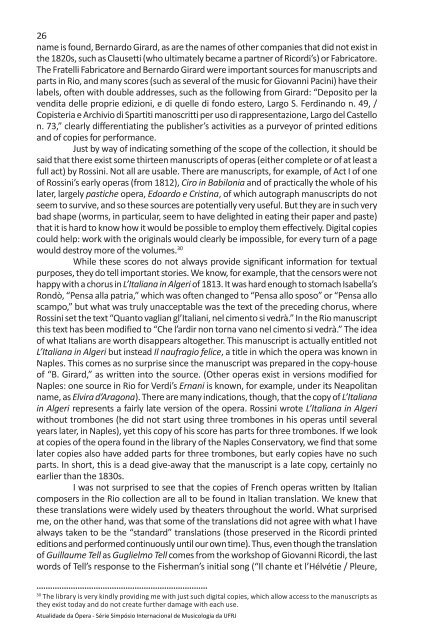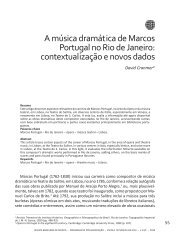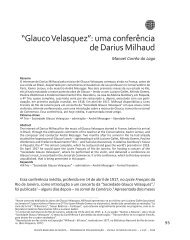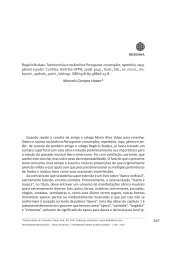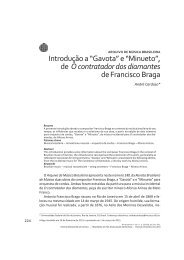Versão Digital - UFRJ
Versão Digital - UFRJ
Versão Digital - UFRJ
You also want an ePaper? Increase the reach of your titles
YUMPU automatically turns print PDFs into web optimized ePapers that Google loves.
26<br />
name is found, Bernardo Girard, as are the names of other companies that did not exist in<br />
the 1820s, such as Clausetti (who ultimately became a partner of Ricordi’s) or Fabricatore.<br />
The Fratelli Fabricatore and Bernardo Girard were important sources for manuscripts and<br />
parts in Rio, and many scores (such as several of the music for Giovanni Pacini) have their<br />
labels, often with double addresses, such as the following from Girard: “Deposito per la<br />
vendita delle proprie edizioni, e di quelle di fondo estero, Largo S. Ferdinando n. 49, /<br />
Copisteria e Archivio di Spartiti manoscritti per uso di rappresentazione, Largo del Castello<br />
n. 73,” clearly differentiating the publisher’s activities as a purveyor of printed editions<br />
and of copies for performance.<br />
Just by way of indicating something of the scope of the collection, it should be<br />
said that there exist some thirteen manuscripts of operas (either complete or of at least a<br />
full act) by Rossini. Not all are usable. There are manuscripts, for example, of Act I of one<br />
of Rossini’s early operas (from 1812), Ciro in Babilonia and of practically the whole of his<br />
later, largely pastiche opera, Edoardo e Cristina, of which autograph manuscripts do not<br />
seem to survive, and so these sources are potentially very useful. But they are in such very<br />
bad shape (worms, in particular, seem to have delighted in eating their paper and paste)<br />
that it is hard to know how it would be possible to employ them effectively. <strong>Digital</strong> copies<br />
could help: work with the originals would clearly be impossible, for every turn of a page<br />
would destroy more of the volumes. 30<br />
While these scores do not always provide significant information for textual<br />
purposes, they do tell important stories. We know, for example, that the censors were not<br />
happy with a chorus in L’Italiana in Algeri of 1813. It was hard enough to stomach Isabella’s<br />
Rondò, “Pensa alla patria,” which was often changed to “Pensa allo sposo” or “Pensa allo<br />
scampo,” but what was truly unacceptable was the text of the preceding chorus, where<br />
Rossini set the text “Quanto vaglian gl’Italiani, nel cimento si vedrà.” In the Rio manuscript<br />
this text has been modified to “Che l’ardir non torna vano nel cimento si vedrà.” The idea<br />
of what Italians are worth disappears altogether. This manuscript is actually entitled not<br />
L’Italiana in Algeri but instead Il naufragio felice, a title in which the opera was known in<br />
Naples. This comes as no surprise since the manuscript was prepared in the copy-house<br />
of “B. Girard,” as written into the source. (Other operas exist in versions modified for<br />
Naples: one source in Rio for Verdi’s Ernani is known, for example, under its Neapolitan<br />
name, as Elvira d’Aragona). There are many indications, though, that the copy of L’Italiana<br />
in Algeri represents a fairly late version of the opera. Rossini wrote L’Italiana in Algeri<br />
without trombones (he did not start using three trombones in his operas until several<br />
years later, in Naples), yet this copy of his score has parts for three trombones. If we look<br />
at copies of the opera found in the library of the Naples Conservatory, we find that some<br />
later copies also have added parts for three trombones, but early copies have no such<br />
parts. In short, this is a dead give-away that the manuscript is a late copy, certainly no<br />
earlier than the 1830s.<br />
I was not surprised to see that the copies of French operas written by Italian<br />
composers in the Rio collection are all to be found in Italian translation. We knew that<br />
these translations were widely used by theaters throughout the world. What surprised<br />
me, on the other hand, was that some of the translations did not agree with what I have<br />
always taken to be the “standard” translations (those preserved in the Ricordi printed<br />
editions and performed continuously until our own time). Thus, even though the translation<br />
of Guillaume Tell as Guglielmo Tell comes from the workshop of Giovanni Ricordi, the last<br />
words of Tell’s response to the Fisherman’s initial song (“Il chante et l’Hélvétie / Pleure,<br />
...........................................................................<br />
30 The library is very kindly providing me with just such digital copies, which allow access to the manuscripts as<br />
they exist today and do not create further damage with each use.<br />
Atualidade da Ópera - Série Simpósio Internacional de Musicologia da <strong>UFRJ</strong>


